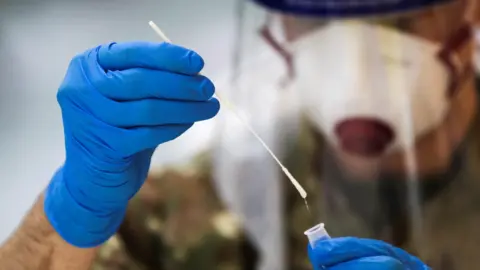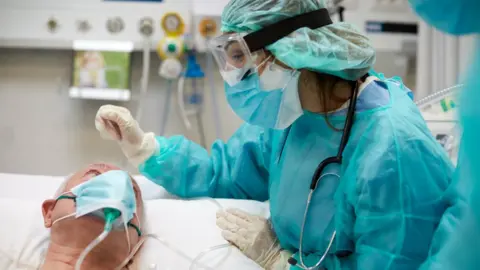Covid-19: Northern Ireland transmission reaching 'extraordinary levels'
 Reuters
ReutersCovid-19 transmission has reached "extraordinary levels" in Northern Ireland, the chief scientific adviser has said.
Prof Ian Young told BBC News NI that about one in 10 people in some parts of Northern Ireland has the virus.
He said he expected a peak in the next two to three weeks.
Almost 12% of the total number of positive cases recorded since the start of the pandemic were reported in the past seven days.
Northern Ireland has recorded a total of 432,492 coronavirus cases, 50,627 of them in the past week.
Health Minister Robin Swann said the Omicron variant had brought an "unprecedent surge", after more than 30,000 cases were recorded in the past four days.
Prof Young said he hoped pressure on hospitals would be less than they were last January, when Northern Ireland was under lockdown measures.
He said case numbers were expected to peak early to mid-January, while hospital pressures were likely to peak in late January to early February.
 Getty Images
Getty ImagesProf Young added that evidence suggested Omicron is less severe than the Delta variant.
"That is going to be what keeps hospital pressures from rising to very high levels.
"I hope if we all play our part that hospital pressures might be able to stay below the pressures we observed last January.
"There does remain a significant threat and we all have a role to play in trying to minimise the pressures that hospitals are going to be under."
Mr Swann said the risk of getting Covid was now "considerably higher" than it had ever been and urged people to get a booster dose of the vaccine.
"Faced with this very real threat, getting your booster dose right now is the single most important step you can take," he said.
 Getty Images
Getty ImagesSince 24 December, the number of patients with Covid in Northern Ireland hospitals has risen from 336 to 348.
As of Tuesday there are 31 Covid-positive patients in intensive care, 25 of whom are ventilated.
These figures are consistent with those recorded during the rest of December.
Northern Ireland's infection rate is the highest in the UK, according to the latest UK government figures.
In the seven days up until 30 December, 2,252 in 100,000 people here had the virus.
Sore throat 'most prominent' Omicron symptom
The pandemic and related pressure on hospital services is also continuing to have an impact on surgical services for cancer.
In total, 162 red flag suspected or confirmed cancer procedures have been cancelled across all health trusts since 26 November, according to figures from the Health and Social Care Board (HSCB).
It said trusts are actively working to offer new dates as soon as possible.
Dr Frances O'Hagan, the deputy chair of the British Medical Association's Northern Ireland GPs committee has said anyone with cold-like symptoms should book a PCR test.
"A sore throat is probably one of the most prominent symptoms for Omicron, so it's really important that people do get tested, especially if you do have any other associated symptoms as well, in particular a temperature."
"It is important to go ahead and get a PCR booked as it is so difficult now to know what the symptoms are."
However the Northern Ireland Executive's advice remains that people should only book a PCR test if they have a high temperature, a new, continuous cough or a loss or change in sense of smell or taste.
Close contacts who are fully vaccinated should take daily lateral flow tests for 10 days following their exposure to the virus.
They should only book a PCR if a lateral flow is positive.
Irish government looking at self-isolation rules
The measures taken to contain the Omicron variant in Northern Ireland were tightened at the end of December.
This includes the closure of nightclubs, table service only at hospitality venues and a limit on the number of people from different households that can sit together.
Proof of Covid status remains a requirement to enter some hospitality premises and some other indoor settings.
Laws surrounding the wearing of face coverings were also strengthened.
In Northern Ireland, people who test positive can leave self-isolation after seven days if they produce negative lateral flow results on days six and seven.
Meanwhile, the Irish government will ask the country's chief medical officer to consider relaxing the self-isolation rules for fully vaccinated close contacts of confirmed Covid cases.
Tánaiste Leo Varadkar said the rules were causing problems across public services, industry and critical infrastructure.
On Tuesday, Boris Johnson announced about 100,000 critical workers will take daily Covid tests to reduce the spread of the virus to colleagues.
The testing, set to begin form 10 January, will include workers in food processing, transport and the border force,

- RULES: What are the restrictions in Northern Ireland?
- OMICRON SURGE: Variant spreading at exceptional pace
- SELF-ISOLATION: You test positive - what next?
- COVID PASSPORTS: How to get one and how to use one
- CASES: What's the state of play in NI?

